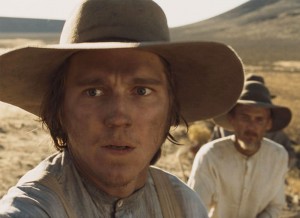Meek’s Cutoff a stark, engaging movie
Patience is truly a virtue when watching a Kelly Reichardt film unfold.
The emotions boil in the silences and action is conveyed from a distance, usually obscured in the corners of the frame. And often, the most significant dialogue occurs off-screen, with viewers straining to hear it.

Wild west · Meek’s Cutoff follows a group of families in 1850 on a journey across the Oregon desert while zeroing in on human nature. - Photo courtesy of Oscilooscope Laboratories
Reichardt’s work, however, is much too cerebral to simply be labeled “slice of life,” even though mood and character tend to trump the story and plotline.
They are slices of lives viewed under a microscope, slices so miniscule that, for some, the film is probably comparable to watching grass grow.
Except there is no grass in Meek’s Cutoff, Reichardt’s latest drama about a group of families making the harrowing trek across the Oregon desert in 1850. The film is a careful examination of the human condition blown to its most extreme, weathered proportions.
Reichardt’s third film set in the Pacific Northwest, Meek’s Cutoff has her working with a much larger scenic scope.
Unlike 2008’s urban plight Wendy and Lucy, the road here goes through a barren desert devoid of water and, as the journey becomes increasingly aimless, hope.
As the three pioneering families are led off course by their over-confident guide, even the breathtaking backdrop of mountains and vast blue skies can’t disguise that this lost journey holds very little promise for the families.
Quite uncommon for Hollywood and Indiewood alike, there are no star turns here, save for the captivating stares of Michelle Williams.
As the fearless matriarch Emily Tetherow, Williams anchors the strong and unwavering ensemble cast that includes Will Patton, Paul Dano and Neal Huff as the husbands, and Shirley Henderson and Zoe Kazan as the wives.
A supremely bearded Bruce Greenwood plays guide Stephen Meek, a dangerous enigma to both the characters and spectators.
The film might be titled Meek’s Cutoff, but this is Emily’s story, and the story of the women who willingly followed their men on the trail until they, too, reached their own cutoff point.
The film takes on a uniquely feminist viewpoint, perhaps inadvertently, considering screenwriter and frequent collaborator Jon Raymond based the script on the diaries of women who attempted the trek.
Numerous shots linger on the women — their sidelong glances, smirks and softly uttered asides as they build fires or knit blankets for the frigid Oregon nights — while the men discuss their plans outside the camera’s vision.
Reichardt subtly hints the women are far more in tune with the perils ahead, and it’s a pleasure to watch as each woman develops throughout the film, from Emily’s tenacity to the distress of Kazan’s Millie.
But the film’s most compelling character is the stark sound design, led mostly by ambient noises pierced by the creaking wheels or boots crunching over dead grass.
The sights and sounds are sewn together like intricate patchwork, creating a mounting tension that never fully resolves itself.
It’s not entirely without satisfaction, however, as Reichardt does understand pacing in her own way. Her resistance to lingering in a place or on an emotion for too long creates a momentum that keeps the audience attentive, even if the wagons drag at the pace of exhausted oxen.
As a director, Reichardt is engaging without pulling any tricks from her hat, instead captivating viewers through the raw, visceral power of filmmaking.
She crafts a fine story of life on the Oregon trail without the threats of a poisonous snakebite or dysentery — the sensational plot devices that composed the beloved computer game.
Yes, gun shots are fired and wagons do tumble off course, but Meek’s Cutoff is built around the fear, hysteria and doubt that festers.
Despite taking place more than 150 years before the setting of Wendy and Lucy, it almost feels like a continuation of that film, exploring the elusive American Dream, this time from beneath the canopy of a wagon.
Although Reichardt continues to give us the skeleton rather than the muscle of the story, the bare bones are more than enough when she places the heart, palpitating with a fervent yet quiet intensity, so openly on display.
It’s a rare skill in the current cinematic landscape, and when something like Meek’s Cutoff comes along, those who can watch the grass grow watch it acutely, yearning for more while also faithfully preserving this masterpiece frame by frame.
